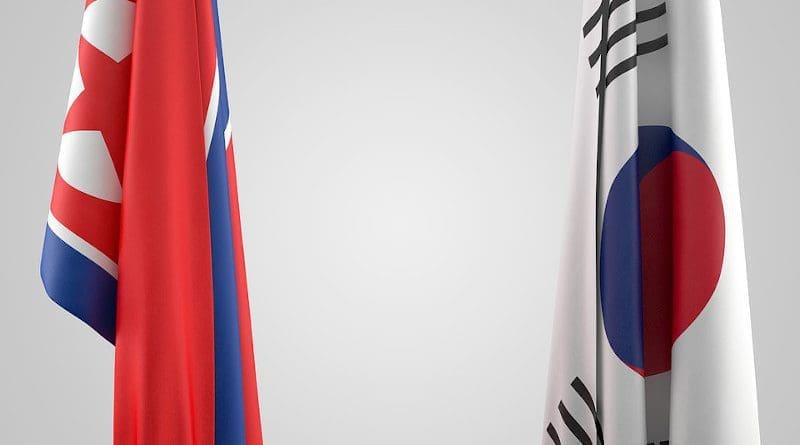Allies Need More Diplomatic Dialogue To Peacefully Denuclearize The Korean Peninsula – Analysis
By Kuyoun Chung*
Although only a few months remain before the end of Moon Jae-in’s presidential term, Seoul is relentlessly pursuing a declaration of an end to the Korean War between Washington and Pyongyang and attempting to revitalise momentum for a denuclearisation dialogue. But the United States and South Korea seem to perceive the tactical value of this declaration differently and are not on the same page over the scenarios they might confront once they issue the declaration.
As a step towards a peace agreement, the Moon administration intends to build trust between the United States and North Korea with the declaration and restart a denuclearisation negotiation. Critics stress the significance of legal enforcement nested in the declaration. Without legal enforcement that ’ends the Korean War,’ as President Moon has suggested, the declaration will not reduce the threat perception in Pyongyang of US ‘hostile policies’ or catalyse the momentum for a nuclear dialogue.
Legal enforcement, on the other hand, requires discussion of the dissolution of United Nations Command, withdrawal of US forces from the Korean peninsula and revision of the South Korea–US Mutual Assistance Treaty. These are scenarios that allies a not ready to countenance yet.
It is one thing, of course, for South Korea and the United States to agree on issuing the end-of-war declaration. It is another to persuade the North to accept it. North Korea has already declared itself as a nuclear state in its constitution, while China, one of North Korea’s few benefactors, prioritises the stability of the Korean peninsula over the denuclearisation of North Korea. The North tactically aligns with China whenever US–North Korea talks fail and even more in a time of US–China rivalry.
Seoul and Washington must take those attitudes as the premises on which they can devise a more realistic strategy for denuclearising North Korea. Contrary to the Moon administration’s thinking, the end-of-war declaration is unlikely to linearly lead to a peace regime on the Korean peninsula. US President Joe Biden needs to accept that denuclearisation is a long-term goal that requires a focus on strengthening deterrence to adapt the North’s ever-developing nuclear and missile capabilities in the region while reassuring allies about that approach.
Conservatives in South Korea have serious concerns about the North’s potential nuclear coercion and nuclear-backed military adventurism. This has even led the conservative People’s Power Party’s presidential candidate, Yoon Seok-youl, to support redeployment of tactical nuclear weapons on the Korean peninsula to maintain the ‘balance of terror’ vis-à-vis North Korea. This long-term investment to strengthen a deterrence posture on the Korean peninsula is intended to change the strategic calculation of the North and China and be more effective than signing a revocable declaration in forging the structure of collective action in which no one has the incentive to deviate.
Increasing joint military exercises to maintain seamless coordination between allies and improving defence infrastructure with technological innovation would reduce the risk of a North Korean miscalculation based on its nuclear and missile capabilities. Strengthening deterrence on the peninsula will signal to China that the North’s nuclear and missile capabilities will not be tolerated as a fait accompli.
China’s lack of cooperation in denuclearising North Korea will be likely to meet a thickening web of allied security cooperation around the Korean peninsula. Security cooperation, such as maritime surveillance to prevent ship-to-ship transfers with North Korean vessels, serves as a good area whereby to mobilise multilateral efforts. This has already seen individual action taken by Japan, Canada, New Zealand, France and Australia.
Denuclearising North Korea requires more than shoring up deterrence, which might harden its resolve and increase tension on the peninsula. The United States and South Korea need to keep open opportunities to engage North Korea’s ruling elites in the long term. Engagement does not have to involve a bold peace offensive, nor does it necessarily have to be in sync with the progress of denuclearisation negotiations. But it does need to persuade the North’s elites that maintaining a nuclear state will isolate their country and limit its potential for future economic growth.
This engagement should include an opportunity for reciprocation by the North, based on the confidence-building measures agreed upon during the Moon administration, such as dismantlement of guard posts along the Demilitarized Zone or restoration of cross-border hotlines. Establishing a liaison office between the two Koreas and the United States would further institutionalise reciprocity and reduce unnecessary tension.
Peaceful denuclearisation is still plausible, but only in the long term. ‘Peaceful’ indicates the progress of denuclearisation in a strategic environment in which nuclear coercion and militarised crisis escalation become costly for the North. Shaping such a strategic environment is the precondition in conducting nuclear diplomacy with North Korea. Consistently sustaining an opportunity for reciprocation will not only reduce tension but also provide North Korean elites with exposure to the world and narrow the alternatives within which they can reorient national strategy to survive.
*About the author: Kuyoun Chung is an Assistant Professor in the Department of Political Science at the Kangwon National University, Gangwon-do.
Source: This article was published by East Asia Forum. A version of this article appear in the most recent edition of East Asia Forum Quarterly, ‘The Korean Way’, Vol 13, No 4.

